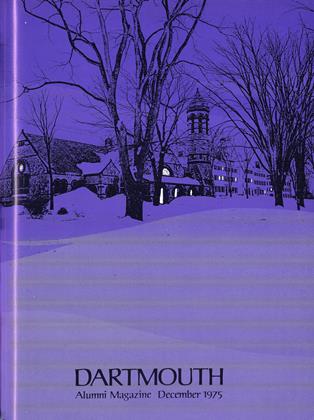IT is, its partisans say, a simple sport. You don't need a helmet and shoulder pads, Waterboys and a press box, or even cheerleaders and a marching band. All you really need to play rugby are a ball and a field and, if you take your game seriously, a keg of beer resting along the sidelines.
It's not Dartmouth's most visible sport nor, probably, is it the most graceful, but it's full of excitement and action and a good excuse to be outdoors when the leaves turn and the first signs of winter are on the way. And this season, when some of the other men's sports have suffered disappointment, the Dartmouth Rugby Club has been as reliable as, say, the women's field hockey team.
Dartmouth's ruggers completed their season with an overall 27-2 record, good enough to lay claim to the title of best in the East. The A and B teams finished undefeated with convincing 10-4 and 32-0 wins at Princeton, while the C team lost only two games all season - both to A teams, itself a measure of the quality of rugby at Dartmouth. The DRC has enough ruggers to field four teams, and in the search for competition will match the C team against the best some other clubs have to offer.
The ruggers, who include a math professor, the fraternity business manager, two medical students and an alumnus working in Woodstock, have managed to beat clubs like Massachusetts, Holy Cross, Boston College, Harvard, Yale, Brown (winners of the spring Ivy rugby tournament the past two years), and Cornell (which was undefeated until its encounter with the DRC late in the fall). And two members, John Shepard, the captain, and Geoffrey Parkins, a graduate student in physics, have made the All-New England team, a select group traditionally composed of Greater Boston rugby club members.
They're the only undefeated rugby team in the Ivy League, but they insist that winning's only half the fun. "The games are important, don't get us wrong,". says Shepard, "but the post-game parties and the comaraderie are important, too. We don't spend all week getting psyched up to 'kill Harvard.' The sport's fiercely competitive, but we enjoy meeting and talking with the guys from the other clubs after the games."
Rugby differs from most of the other sports on the Dartmouth athletic scene because it's completely student run and independently financed. There are no coaches, no strict training rules, and no mandatory practices. "We just get a bunch of guys out there and have a lot of fun," Shepard says.
The ruggers plan their own trips, drive themselves, and find their own places to stay (frequently women's colleges). They pay $15 dues per term to pay for balls and beers and buy their own uniforms. Their annual spring trip is financed by alumni contributions and supplemented by the players themselves.
Part of rugby's appeal, members say, is the relative informality of the club. Most of the ruggers are high school athletes who tired of the rigid demands of "official" sports but still wanted to compete athletically. "Rugby here's not as structured as most of the team sports, but you still get the chance to have some fun and meet a lot of people," says Brian Deevy, a junior.
"In rugby, 15 players are on the field playing the whole game," Shepard says. "Where's the fun in football if you're not on the first string?
A phalanx of A team ruggers flies againstBrown on the way to an undefeated season.Partly obscured in the midst of 12 Dartmouthplayers in the picture is one lonelylad from Providence (fourth from right).
A phalanx of A team ruggers flies againstBrown on the way to an undefeated season.Partly obscured in the midst of 12 Dartmouthplayers in the picture is one lonelylad from Providence (fourth from right).
 View Full Issue
View Full Issue
More From This Issue
-
 Feature
FeatureQuite Contrary
December 1975 By SAMUEL PICKERING -
 Feature
FeatureThe Assault On Quebec
December 1975 By LEWIS STILWELL -
 Feature
FeatureHigh On Your Dial
December 1975 By DAN NELSON -
 Feature
FeatureDartmouth Radical Union
December 1975 By M.B.R. -
 Class Notes
Class Notes1959
December 1975 By DOUGLAS WISE, BARRY R. BLAKE -
 Class Notes
Class Notes1950
December 1975 By JACQUES HARLOW, EDWARD TUCK II
D.M.S.
-
 Article
ArticleFresh Man in Washington
November 1975 By D.M.S. -
 Article
ArticleBasement Admiral
December 1975 By D.M.S. -
 Article
ArticleLife wifi Emma
March 1976 By D.M.S. -
 Article
ArticleRescuing an Elephant on Wheels
March 1976 By D.M.S. -
 Article
ArticlePolitics Grow Greener
May 1976 By D.M.S. -
 Article
ArticleThe Seniors Writ Large: Some Sit Right, Some Don't
June 1976 By D.M.S.








